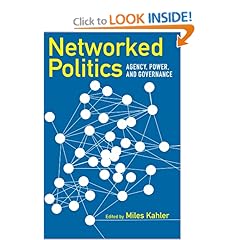 This is a useful volume on networks and politics. For those who are not steeped in the literature, a network is a structure that has a number of actors working together in a non-hierarchical manner, although--in public administration--the term has a zillion different meanings (making things more confusing). The editor of this volume, Miles Kahler, notes that there are two approaches to networks--(a) structures; (b) actors (as opposed to hierarchical actors).
This is a useful volume on networks and politics. For those who are not steeped in the literature, a network is a structure that has a number of actors working together in a non-hierarchical manner, although--in public administration--the term has a zillion different meanings (making things more confusing). The editor of this volume, Miles Kahler, notes that there are two approaches to networks--(a) structures; (b) actors (as opposed to hierarchical actors).The book explores networks in action. The various parts of this book: Part I: International economic networks and constitutional networks; Part II: networks and collective action; Part III: power and accountability in networks; Part IV: networks and international governance.
It's hard to describe the essence of this book in 25 words or less. Nonetheless, it is a useful volume laying out the political implications of network structures.
Product Description
Contributors
Peter Cowhey, University of California, San Diego.
Mette Eilstrup-Sangiovanni, University of Cambridge and Sidney Sussex College, Cambridge
Zachary Elkins, University of Texas at Austin
Emilie M. Hafner-Burton, Princeton University
Miles Kahler, University of California, San Diego.
Michael Kenney, Pennsylvania State University
David A. Lake, University of California, San Diego
Alexander H. Montgomery, Reed College
Milton Mueller, Syracuse University School of Information Studies and Delft University of Technology
Kathryn Sikkink, University of Minnesota
Janice Gross Stein, University of Toronto
Wendy H. Wong, University of Toronto
Helen Yanacopulos, Open University
The concept of network has emerged as an intellectual centerpiece for our era. Network analysis also occupies a growing place in many of the social sciences. In international relations, however, network has too often remained a metaphor rather than a powerful theoretical perspective. In Networked Politics, a team of political scientists investigates networks in important sectors of international relations, including human rights, security agreements, terrorist and criminal groups, international inequality, and governance of the Internet. They treat networks as either structures that shape behavior or important collective actors. In their hands, familiar concepts, such as structure, power, and governance, are awarded new meaning.--This text refers to the Hardcover edition.
From the Back Cover
"This path-breaking volume generates a set of exciting research questions about the role of networks in world politics, and offers some innovative methodologies to facilitate their empirical investigation.Anyone interested in new ways of thinking aboutworld politics should read Networked Politics."--Robert O. Keohane, Princeton University --This text refers to the Hardcover edition.
Click Here to see more reviews about: Networked Politics: Agency, Power, and Governance (Cornell Studies in Political Economy) (Paperback)
No comments:
Post a Comment